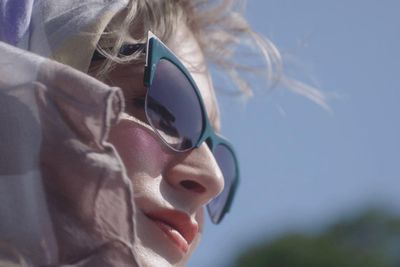In this docu-style film work, director Chase Joynt dons an ivy style suit in the opening black and white shot of his movie Framing Agnes. He resembles Rod Serling of the "Twilight Zone" as he introduces us to Christine Jorgensen considered to be the first American trans celebrity.
The "Twilight Zone" reference is meant only to give you the decor of news studio at the time. Midcentury television news was mostly a colorless platform with minimal set design and oversaturated Tactype: an old-school method of putting titles on screen.
And that's the mood Joynt wants because that's the era in which parts of his film are supposed to recreate. In the early 1960s, Dr. Harol Garfinkel, a respected American sociologist, was studying gender identities and "intersexed people." In other words, how trans people achieved "passing" in their daily lives.
Both he and his colleague Dr. Robert Stoller conducted interviews with numerous trans people in the 60s at the University of California, Los Angeles (UCLA) and documented their exchanges. The Agnes of the title was one of those people, but it turns out she wasn't completely honest with her interview responses. That's because she wanted to make the full transition to female, therefore lying in hopes to achieve approval.
However, Agnes is only a part of this deep dive into trans history. Several other transcripts from other midcentury trans folks are performed television interview-style across from Joynt as he takes on the persona of Garfinkel, asking probing questions and wanting intimate details about their histories for his research.
These vignettes are interspersed with commentary from author Dr. Jules Gill-Peterson, a trans rights historian and Associate Professor of History at Johns Hopkins University. She is celebrated in her field and offers a modern commentary about the stories being told throughout the film.
Framing Agnes, as with most movies, exists to educate the few who seek knowledge about trans experiences, but mostly, I believe, to empower those who identify with its subject matter. To the general public, it could be considered schadenfreude, but to those living the life, it becomes much more of a historical earmark that has more similarities to the present than you think.
For instance, one interview focuses on Georgia, an African-American trans woman, played by Angelica Ross. Georgia's story spans from the 50s into the 60s when the interview was conducted. She explains how she lived as a trans woman through America's darkest times. Recalling, segregation, discrimination, and finding a relationship. At one point Ross says walking through life as a black trans woman could still get you arrested. “All eyes are on you and it’s not always a good feeling."
Fast-forward to modern times and things have barely changed. This is emphasized as clips from Katie Couric's infamous 2014 interview with Laverne Cox splashes on screen. Couric, in her ignorance, wants to focus on the body parts to which Cox interjects saying, "By focusing on bodies we don’t focus on the lived realities of that [trans] oppression and that discrimination,” she snapped at Couric.
Framing Agnes also acts out Garfinkel's interviews with midcentury trans men and trans youth clad in clothing and makeup of the period. As Dr. Gill-Peterson points out, just because trans rights are a hot topic today doesn't mean they didn't exist back then.
Joynt has created something bold here. The project isn't shocking or groundbreaking. It's simply conversations with men and women who were interviewed by an academic elite doing a specialized study to secure his place in history. Once his study was published, that was it. All of the transcripts were shoved to the back of a rusty file cabinet and labeled as "archives."
The film picks at old social wounds that are still healing even as America is seemingly becoming more progressive. "Framing Agnes" deserves to be seen as not only a study in those who came before us but as a reminder that even with the weakest voice there's power. The world needs that today.
Meet the director of Framing Agnes, Chase Joynt:
